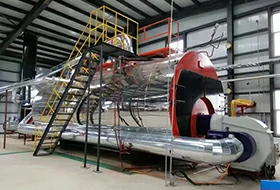
Dez. . 12, 2024 14:14 Back to list
biomass fired hot water boiler
Biomass Fired Hot Water Boiler An Eco-Friendly Heating Solution
In recent years, the importance of sustainable energy solutions has gained significant attention, especially in the context of global warming and environmental degradation. Among various renewable energy sources, biomass has emerged as a viable option for heating systems, particularly through the use of biomass-fired hot water boilers. These boilers not only offer a renewable source of energy but also contribute to a reduction in greenhouse gas emissions, making them an eco-friendly heating solution.
What is Biomass?
Biomass refers to organic materials derived from plants and animals. This includes wood, agricultural crops, residues, and even municipal waste. When utilized for energy production, biomass is considered carbon-neutral because the amount of carbon dioxide (CO2) released during combustion is roughly equivalent to what the plants absorbed during their growth. This cycle makes biomass a sustainable alternative to fossil fuels.
How Biomass Fired Hot Water Boilers Work
Biomass-fired hot water boilers operate by burning biomass materials to generate heat
. This heat is then used to raise the temperature of water, producing hot water that can be utilized for various heating applications such as residential heating, commercial heating, or even industrial processes.The operation of these boilers can be broken down into several key components
1. Fuel Storage Biomass materials, like wood pellets or chips, are stored in a designated area. 2. Feeding System An automated feeding system transports the biomass into the combustion chamber, where it is ignited. 3. Combustion Chamber In this area, the biomass is burned at a high temperature. The heat generated from this process warms the surrounding water. 4. Heat Exchanger This component transfers heat from the combustion gases to the water, ensuring efficient heat transfer. 5. Flue Gas Cleaning System To minimize emissions, many modern biomass boilers include filters and scrubbers that clean the flue gases before they are released into the atmosphere.
Advantages of Biomass Fired Hot Water Boilers
biomass fired hot water boiler

1. Renewable Energy Source Biomass is a renewable fuel, as it can be replenished over time through sustainable management of forests and agricultural practices. 2. Lower Emissions Compared to traditional fossil fuel boilers, biomass boilers produce significantly lower levels of CO2 and other harmful pollutants, contributing to cleaner air.
3. Energy Independence Utilizing locally sourced biomass can reduce reliance on imported fossil fuels, enhancing energy security for communities and nations.
4. Utilization of Waste Biomass boilers can use waste materials like wood chips or agricultural residues, helping to manage waste while generating energy.
5. Versatile Applications Biomass-fired hot water boilers can be utilized in various settings including residential heating systems, commercial buildings, and even agricultural operations, making them versatile heating options.
Challenges and Considerations
Despite their numerous benefits, biomass-fired hot water boilers face certain challenges. The availability and sustainability of biomass resources can vary greatly by region, which may limit their applicability. Additionally, proper technology and infrastructure are required to handle biomass efficiently, including storage, combustion, and emissions management systems.
Furthermore, the cost of installing and maintaining biomass boilers can be higher than that of conventional fossil fuel systems, although government incentives and financing options may help mitigate these costs.
Conclusion
Biomass-fired hot water boilers represent a promising solution for sustainable heating needs. As the world continues to seek out alternatives to fossil fuels, the advantages of biomass in reducing emissions and utilizing renewable resources become increasingly important. With proper management and technological advancements, biomass can play a pivotal role in building a cleaner and more sustainable energy future. Embracing this eco-friendly heating solution can help mitigate climate change, support local economies, and create a better environment for future generations. Whether for homes, businesses, or industries, the transition to biomass heating represents a significant step toward achieving energy sustainability.
-
High-Efficiency Commercial Oil Fired Steam Boiler for Industry
NewsJul.30,2025
-
High-Efficiency Biomass Fired Thermal Oil Boiler Solutions
NewsJul.30,2025
-
High Efficiency Gas Fired Thermal Oil Boiler for Industrial Heating
NewsJul.29,2025
-
High-Efficiency Gas Fired Hot Water Boiler for Sale – Reliable & Affordable
NewsJul.29,2025
-
High Efficiency Biomass Fired Hot Water Boiler for Industrial and Commercial Use
NewsJul.29,2025
-
High-Efficiency Biomass Fired Hot Water Boiler for Industrial Use
NewsJul.28,2025
Related PRODUCTS






















